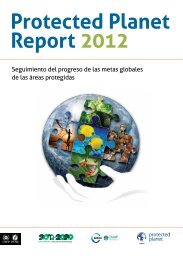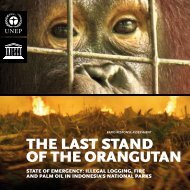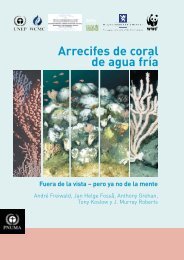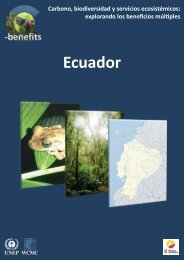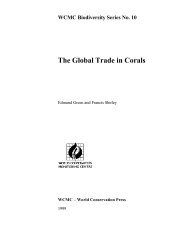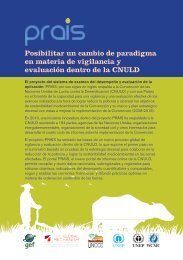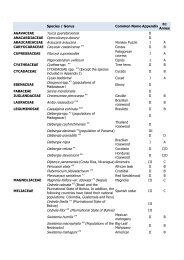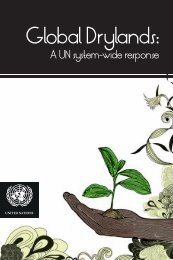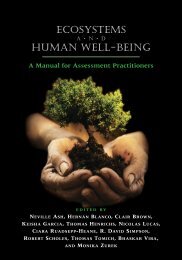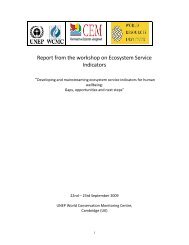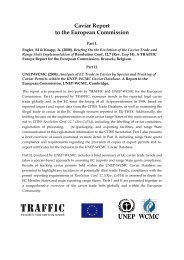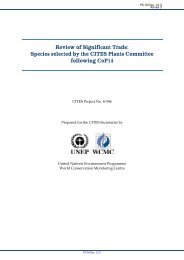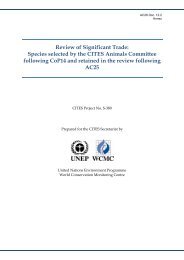FOREST LANDSCAPE RESTORATION - UNEP World Conservation ...
FOREST LANDSCAPE RESTORATION - UNEP World Conservation ...
FOREST LANDSCAPE RESTORATION - UNEP World Conservation ...
You also want an ePaper? Increase the reach of your titles
YUMPU automatically turns print PDFs into web optimized ePapers that Google loves.
16<br />
Sectors with quite supportive statements are 6 (environment, agriculture/livestock, energy, land, women and youth).<br />
TAS has very supportive statements on attempt to halt pressure that reduces forest functionality but, PRSP and the<br />
Tanzania Development Vision 2025 are neutral.<br />
4.2.12 Supporting or encouraging development of new ideas<br />
All the sector policies and national strategies reviewed are supporting development of new ideas. Policy makers and<br />
implementers of the policies are encouraged to be innovative and open to new ideas beyond the traditional system of<br />
managing natural resources. Science and technology is emphasised to have a central role in implementing all policies.<br />
For example the Tanzania Development Vision 2025 section 4.2 (vi) states that “ The quality of livelihood should be<br />
raised by increasing the level of productivity in all sectors. This goal can be achieved by transforming the economy<br />
into strong, resilient and competitive one, buttressed by science and technology”<br />
Sectors with very supportive statements on encouraging development of new ideas are 9 (forestry, environment,<br />
wildlife, fishery, beekeeping, energy, mineral, tourism and science/technology. Those with quite supportive statements<br />
are 4 (agriculture/livestock, land, women and youth).<br />
4.2.13 Provision of strong links to other sector goals and strategies<br />
Sector policies and national strategies reviewed all have very supportive statements providing strong links to other<br />
sector goals and strategies. The links could enhance introduction and promotion of FLR that requires multi-sectoral cooperation<br />
in its implementation.<br />
4.3 Donor policies<br />
Tanzania has a long history on development co-operation programmes which dates back to the early 1960s at the time<br />
of independence. Donor assistance has therefore played and continues to play an important role in the development of<br />
Tanzanian economy. Currently donor contribution accounts for 80 percent of the total government development<br />
budget (Planning Commission 1999&2000). Tanzania has development co-operation programmes with over 50<br />
government/donors, international financial institutions and NGOs covering hundreds of projects virtually in all sectors.<br />
External assistance to Tanzania averages US$ 900 million per annum between 1994-1997 (Planning Commission<br />
2000).<br />
Recent developments on aid fatigue, rising corruption and lack of progress in reducing poverty have generated strong<br />
debate on the effectiveness of aid to Tanzania. To enhance donor assistance to Tanzania, the government has<br />
collaborated with donor agencies to harmonise donor policies in Tanzania both at national and international levels.<br />
Some of the most recent developments in donor policies include the following:<br />
• The New Nordic –Tanzania Development Partnership,<br />
• OECD’s DAC – Shaping the 21-Century,<br />
• The Tokyo International Conference on African Development (TICAD II),<br />
• The Tokyo Agenda for Action,<br />
• The Stockholm Workshop on Making Partnerships Work on the Ground.<br />
Main emphasis on the above initiatives that are considered as guiding policies for donor support in Tanzania is on:<br />
• Promoting local ownership and leadership<br />
• Promoting partnership<br />
• Improving aid co-ordination mechanism<br />
• Improving transparency, accountability and predictability of aid<br />
• Harmonising donor policies and procedures<br />
• Strengthening capacity of aid recipient Government.<br />
To address the above concerns, the government of Tanzania in collaboration with development partners, prepared the<br />
“Tanzania Assistance Strategy” (TAS). The Planning Commission (2000) indicated that the Tanzania Assistance<br />
Strategy is not a programme or project, but a process for enhancing effective donor support to Tanzania development<br />
and poverty eradication.



